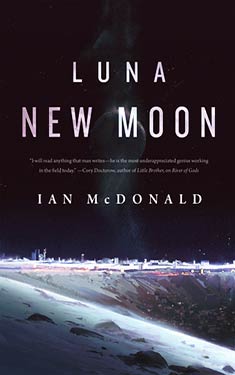Ian McDonald
Completed 4/10/2019,
Reviewed 4/11/2019
4 stars
This book is
the definition of space opera. It’s sort
of a cross between a prime-time soap opera and The Godfather set on the
Moon. It’s about five families, known as
the Five Dragons, who control five different mega-corporations on the Moon and
their wars with each other. At first I
didn’t care for the book. I was
overwhelmed with the number of characters (of which there is a three- or
four-page glossary before the book starts) and the constant changes in
perspectives among many of them.
Somewhere after about a third of the way through, I got hooked into the
story and found it a fascinating and engrossing thrill-ride. It’s the first book in a three-part (so far)
series that ends with a bang, but also leaves you hanging for the sequel. The book won the Gaylactic Spectrum Award in
2016 for positive portrayal of LGBTQ themes in SF/Fantasy.
 The majority
of the story centers around the Corta family, led by the matriarch Adriana. Hailing from Brazil, they control the extraction
of Helium-3, fulfilling the energy demands of the Earth. She is old, and there is tension between two
of her children, Rafa and Lucas, over who will have control of the company when
she dies. More immediately, there is a
sort of lukewarm war between the Cortas and another family, the McKenzies, who
run a mega-mining operation. There are
assassinations and attempts, arranged marriages to create alliances, vendettas,
and all sorts of intrigue within and between each family. All this in an environment where the line
between life and death is razor sharp.
In fact, people must pay for the Four Elementals: water, air, carbon, and data. People pay per breath. Become unemployed, and soon you will suffocate
from not being able to afford your breathing.
But this is a minor issue for the ultra-rich Five Dragons.
The majority
of the story centers around the Corta family, led by the matriarch Adriana. Hailing from Brazil, they control the extraction
of Helium-3, fulfilling the energy demands of the Earth. She is old, and there is tension between two
of her children, Rafa and Lucas, over who will have control of the company when
she dies. More immediately, there is a
sort of lukewarm war between the Cortas and another family, the McKenzies, who
run a mega-mining operation. There are
assassinations and attempts, arranged marriages to create alliances, vendettas,
and all sorts of intrigue within and between each family. All this in an environment where the line
between life and death is razor sharp.
In fact, people must pay for the Four Elementals: water, air, carbon, and data. People pay per breath. Become unemployed, and soon you will suffocate
from not being able to afford your breathing.
But this is a minor issue for the ultra-rich Five Dragons.
The world
created on the Moon is one of extreme capitalism run amok. There is no law but contract law. You can murder, steal, cheat on your spouse,
and so on, as long as you have not signed a contract forbidding it. And when contract breaches come to court,
they can be settled by a duel. There are
no guns on the moon because of the chances of puncturing holes in the protected
environments, so the duels usually involve knives. And there is no democracy, no government of
any kind. Everything is basically controlled
by the Five Dragons.
Like a TV show
like Dallas or Dynasty, almost all the characters are part of one of the five
families, or work for them. We don’t get
a taste of what it’s like to be poor on the Moon, except through the eyes of
one character, Mariana, a fairly recent immigrant who with her friend (or lover,
I was never sure exactly which) are within pennies of running out of breaths. Fortunately, she gets a job with the Cortas,
but not before her friend dies from lack of payment. However, Mariana’s struggle with poverty
really only occurs at the beginning.
Once she is employed, we don’t experience what the lower classes
experience ever again. This is too bad, for
though it would make the book much longer, it might have made the world a
little more fully developed.
I was really
surprised that I liked the characters in the Corta family even though they had
their share of moral repugnance. They’re
not the good guys. They are just most
three-dimensional characters of the book.
There is a machismo that runs through the men of the family, which is a fatal
flaw for many of them, particularly Carlosinho and Lucas. I liked Lucasinho, Adriana’s mostly gay
grandson. At seventeen, he attempts to
run away from home and live without his family. He has to learn to live by his wits since his
father Lucas cuts him off from his accounts.
I also liked Ariel, Adriana’s daughter who is a lawyer and an asexual. And lastly, I was intrigued by Wagner,
Adriana’s youngest son, who is a “wolf”.
He lives in a pack and is influenced by the full Earth in the sky. The concept of a wolf seemed to be a little
hokey, but it intrigued me and I wish there was a little more description of
what being a wolf actually entails.
I give the
book four stars out of five. It took a
while to grab me, but once it did, I wanted to keep on reading. However, I don’t necessarily feel compelled
to follow the story into the next books.
The prose is decent, but I didn’t like how the perspective changed
numerous times through a chapter. This was
especially problematic in the beginning when there are so many characters being
introduced. I recommend this book to
anyone who likes space opera.
No comments:
Post a Comment